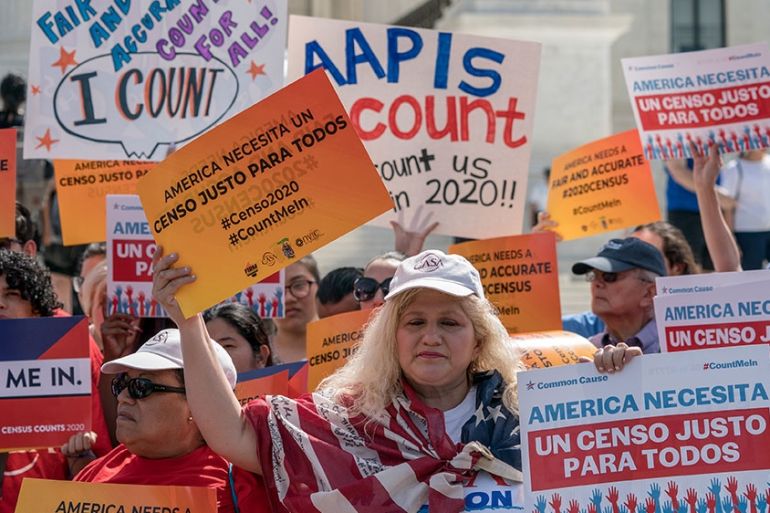US Supreme Court weighs citizenship question for 2020 census
Court’s conservative majority appears ready to OK question – a move rights groups say would result in an undercount.

Washington, DC – Loz Castro, an undocumented immigrant from Colombia, stood outside the United States Supreme Court on Tuesday, defiantly saying she would not participate in the 2020 census if it included a question on citizenship.
“No. [It] goes against my right for privacy, and it is my legal right,” she told Al Jazeera through a translator.
Keep reading
list of 4 items‘Children of the Ganges’ — The boatmen of India’s Varanasi
‘I am prepared to die’: Mandela’s speech which shook apartheid
‘Prejudice, Islamophobia’: Free speech fears as UK redefines extremism
“My son, he is special needs, he has a better future here,” the Maryland resident said, explaining that she chose to stay in the US with her son because here, as is not the case in Colombia, he has access to “what he needs, medically and in education”.
Castro joined dozens of protesters outside the court on Tuesday as justices heard oral arguments in a case that will determine whether the US government can ask every US resident about citizenship during the 2020 census.
Three lower courts have ruled against the government’s plan to add the citizenship question to the census, saying it would discourage those without proper documents from being counted.
But local media reported on Tuesday that the conservative-majority Supreme Court seemed poised to side with the government and allow the census to go ahead with the question. Rights groups and many undocumented residents, including Castro, say the move would put areas with large immigrant and Latino populations at risk of losing federal funding and representation.
The census, which takes place every 10 years, is used to determine how many seats states have in the House of Representatives and how much federal funding they receive. States with a large number of undocumented residents tend to vote Democratic.
The administration of US President Donald Trump argues the citizenship question is needed to obtain better data to enforce the Voting Rights Act. But opponents argue the question would deter immigrant households from participating, resulting in an undercount, which would unfairly benefit Republicans.
‘We are here’
Outside the Supreme Court on Tuesday, rights groups, undocumented immigrants, and people against the citizenship question chanted, “Without status or with status, we are here”.
Alex Vazquez, a member of CASA, an organisation advocating for Latino and immigrants in Maryland, said the biggest fear among immigrants is that the Trump administration will use their information inappropriately.
“What we don’t want is for people to feel their information can be used against them,” Vazquez told Al Jazeera. “We want their information to be secure.”
Claudia Alarco Alarco moved with her family to the US from Peru when she was five years old. She said that immigrants, both documented and undocumented, are “asking for just treatment that we so rightfully deserve because of the contributions we have made in this country”.
She added that Trump has consistently targeted immigrants, particularly immigrants of colour.
Since coming to office, Trump has instituted a zero-tolerance policy at the US southern border. He has also slashed refugee levels to their lowest in years. In 2018, the Supreme Court handed the administration a win, allowing it to implement a travel ban that targets several Muslim-majority countries.
Inside the courtroom, there appeared to be a clear divide between the court’s five conservative justices and the four more liberal-leaning justices, US media reported.
According to Reuters, Chief Justice John Roberts, a pivotal vote on the court, and Justice Brett Kavanaugh, the newest addition to the court and a Trump appointee, said that it’s not uncommon for countries to ask about citizenship during their population counts.
“It’s very common question internationally,” Kavanaugh was quoted as saying.
But the court’s liberal justices, including Sonia Sotomayor, said Commerce Secretary Wilbur Ross’s decision to add the question is a “solution in search of a problem”, according to the Associated Press.
The last time the United States asked about citizenship during the census was in 1950.
A decision from the court is expected by late June, in time to print the census forms for the April 2020 count.